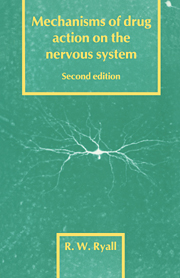Book contents
- Frontmatter
- Contents
- Preface to the second edition
- Preface to the first edition
- List of abbreviations
- 1 Introduction
- 2 Techniques
- PERIPHERAL NERVOUS SYSTEM
- CENTRAL NERVOUS SYSTEM
- 5 Central neurotransmitters and neuromodulators
- 6 The blood-brain barrier
- 7 General anaesthetics
- 8 Pain and analgesia
- 9 Drug interactions with inhibitory amino acids
- 10 Drugs used in schizophrenia
- 11 Affective and manic depression
- 12 Disorders associated with defined brain lesions
- Selected reading
- Index
11 - Affective and manic depression
from CENTRAL NERVOUS SYSTEM
Published online by Cambridge University Press: 08 October 2009
- Frontmatter
- Contents
- Preface to the second edition
- Preface to the first edition
- List of abbreviations
- 1 Introduction
- 2 Techniques
- PERIPHERAL NERVOUS SYSTEM
- CENTRAL NERVOUS SYSTEM
- 5 Central neurotransmitters and neuromodulators
- 6 The blood-brain barrier
- 7 General anaesthetics
- 8 Pain and analgesia
- 9 Drug interactions with inhibitory amino acids
- 10 Drugs used in schizophrenia
- 11 Affective and manic depression
- 12 Disorders associated with defined brain lesions
- Selected reading
- Index
Summary
The affective disorders include a variety of conditions characterised by mood changes unrelated to life events, i.e. they are not reactive. There is major depression, sometimes referred to as psychotic or endogenous depression, mania and bipolar or manic depression. Any extreme of mood may be associated with psychosis in which thinking may become irrational and delusional. Since drug therapy should be based upon symptomatology and not on diagnosis this should not cause problems. However, it has sometimes been rather difficult to differentiate clearly manic depression from schizophrenia and the boundaries may merge. In typical cases the distinction is clear. There may also be a tendency for the nature of the illness to change over the years and the diagnosis may change accordingly. Until the major mental illnesses can be characterised completely in terms of specific disorders in structure or function, diagnosis will need to remain linked to symptoms and treatment. A recent promising beginning is the association of a genetic abnormality with the illness.
Endogenous depression
Drugs used (Fig. 11.1) in treating major depression include tricyclic compounds like imipramine, tetracyclics like mianserin and monoamine oxidase inhibitors, such as nialamide, which are no longer used to any great degree. Prior to the use of these substances the only available procedures included leptazol or insulin shock therapy and electroconvulsive therapy (ECT). Of these only ECT survives today, although the use of ECT varies greatly from one centre to another.
- Type
- Chapter
- Information
- Mechanisms of Drug Action on the Nervous System , pp. 193 - 202Publisher: Cambridge University PressPrint publication year: 1989

